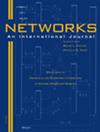Maximum flow‐based formulation for the optimal location of electric vehicle charging stations
IF 1.3
4区 计算机科学
Q4 COMPUTER SCIENCE, HARDWARE & ARCHITECTURE
引用次数: 0
Abstract
With the increasing effects of climate change, the urgency to step away from fossil fuels is greater than ever before. Electric vehicles (EVs) are one way to diminish these effects, but their widespread adoption is often limited by the insufficient availability of charging stations. In this work, our goal is to expand the infrastructure of EV charging stations, in order to provide a better quality of service in terms of user satisfaction (and availability of charging stations). Specifically, our focus is directed towards urban areas. We first propose a model for the assignment of EV charging demand to stations, framing it as a maximum flow problem. This model is the basis for the evaluation of user satisfaction with a given charging infrastructure. Secondly, we incorporate the maximum flow model into a mixed‐integer linear program, where decisions on the opening of new stations and on the expansion of their capacity through additional outlets is accounted for. We showcase our methodology for the city of Montreal, demonstrating the scalability of our approach to handle real‐world scenarios. We conclude that considering both spacial and temporal variations in charging demand is meaningful when solving realistic instances.基于最大流量的电动汽车充电站优化选址方案
随着气候变化的影响日益加剧,人们比以往任何时候都更迫切需要摆脱化石燃料。电动汽车(EV)是减少这些影响的一种方式,但其广泛采用往往受到充电站不足的限制。在这项工作中,我们的目标是扩大电动汽车充电站的基础设施,以便在用户满意度(和充电站可用性)方面提供更优质的服务。具体来说,我们的重点是城市地区。我们首先提出了一个将电动汽车充电需求分配到充电站的模型,将其视为一个最大流量问题。该模型是评估用户对给定充电基础设施满意度的基础。其次,我们将最大流量模型纳入一个混合整数线性程序,在该程序中,关于开设新充电站和通过增加网点扩大充电站容量的决策都被考虑在内。我们在蒙特利尔市展示了我们的方法,证明我们的方法具有可扩展性,能够处理现实世界中的各种情况。我们的结论是,在解决实际问题时,考虑充电需求的空间和时间变化是有意义的。
本文章由计算机程序翻译,如有差异,请以英文原文为准。
求助全文
约1分钟内获得全文
求助全文
来源期刊

Networks
工程技术-计算机:硬件
CiteScore
4.40
自引率
9.50%
发文量
46
审稿时长
12 months
期刊介绍:
Network problems are pervasive in our modern technological society, as witnessed by our reliance on physical networks that provide power, communication, and transportation. As well, a number of processes can be modeled using logical networks, as in the scheduling of interdependent tasks, the dating of archaeological artifacts, or the compilation of subroutines comprising a large computer program. Networks provide a common framework for posing and studying problems that often have wider applicability than their originating context.
The goal of this journal is to provide a central forum for the distribution of timely information about network problems, their design and mathematical analysis, as well as efficient algorithms for carrying out optimization on networks. The nonstandard modeling of diverse processes using networks and network concepts is also of interest. Consequently, the disciplines that are useful in studying networks are varied, including applied mathematics, operations research, computer science, discrete mathematics, and economics.
Networks publishes material on the analytic modeling of problems using networks, the mathematical analysis of network problems, the design of computationally efficient network algorithms, and innovative case studies of successful network applications. We do not typically publish works that fall in the realm of pure graph theory (without significant algorithmic and modeling contributions) or papers that deal with engineering aspects of network design. Since the audience for this journal is then necessarily broad, articles that impact multiple application areas or that creatively use new or existing methodologies are especially appropriate. We seek to publish original, well-written research papers that make a substantive contribution to the knowledge base. In addition, tutorial and survey articles are welcomed. All manuscripts are carefully refereed.
 求助内容:
求助内容: 应助结果提醒方式:
应助结果提醒方式:


